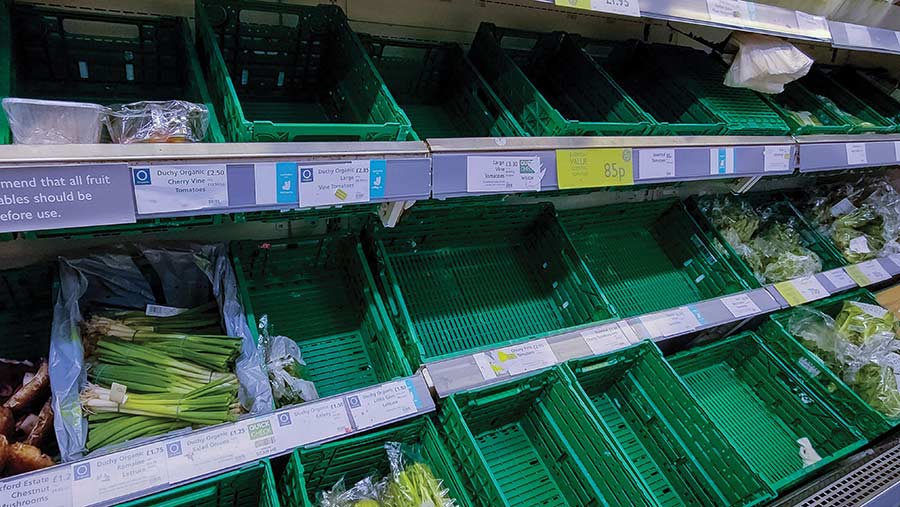OFC 2024: Risk-reward ratio in supply chain ‘out of kilter’
 © Stephen Chung/Alamy Stock Photo
© Stephen Chung/Alamy Stock Photo Risk must be fairly distributed across the food supply chain instead of sitting with farmers and growers to secure a more sustainable footing for the industry.
This is according to a report launched for the 2024 Oxford Farming Conference (OFC).
Over the past five years, the food and farming sector has experienced “significant shocks”, including the impact of Brexit and the Covid-19 pandemic, the war in Ukraine, climate change and soaring “agflation” costs in fuel, feed, fertiliser, energy and labour.
See also: OFC 2023: Report seeks fairness for farmers in food supply chain
Years of “permacrisis” have left farming’s confidence and bank balances at an all-time unsustainable low, says the report’s author, Ged Futter.
Mr Futter has over 30 years of experience in the retail sector, including 15 years working as a buyer at Asda.
These events have exposed pre-existing and fundamental weaknesses in the supply chain and “we are now in an era of volatility”, he says.
As a result, the risk-versus-reward ratio is now “out of kilter”, which means many farmers are asking “is it worth doing it?”, Mr Futter says.
Increasingly, farmers are leaving the sector and using the land for non-agricultural uses because they cannot afford to continue to subsidise the cheap food that UK consumers have become used to – glasshouses are being closed and orchards are being grubbed up.
Mr Futter’s report – Is the UK Food Supply Chain Broken? – is based on more than 40 interviews with business owners across fresh produce, eggs, poultry, pork, importers, frozen food manufacturers and various consultants.
It presents key insights and considers a range of potential solutions to enable the industry to “thrive and not just survive” in the future.
Four key statistics in report
- 52% of a grower’s costs spent on labour in some horticulture businesses
- £2,000-£2,500 is the average cost of an audit with a UK retailer
- 50% of vegetables produced in the UK consumed domestically
- 15% of soft fruit produced in the UK consumed here
Retailer practices ‘must change’
The retailers have become more sophisticated at finding ways of getting better prices and most farmers/growers/packers have not kept up, says Mr Futter.
Fixed-price, long-term trade agreements, inexperienced buyers who can be “more aggressive and less empathetic”, and burdensome audits over the past 10 years “have squeezed every drop of profit from many of the suppliers”.
However, Mr Futter argues that much-peddled headlines over the past five years, suggesting the food chain is “broken” and the responsibility sits solely with retailers, fundamentally ignore other participants in the industry.
These include farmers, growers, governmental bodies and NGOs.
The report urges retailers to change their behaviour, but it also says a change of mindset from all stakeholders is needed “to ensure true collaboration, built on trust”.
What farmers and growers can do
Farmers and growers often focus on being better food producers, when they should focus more on being better buyers and sellers, Mr Futter says.
His interviews with farmers and growers revealed they are “not great looking at numbers” and several use outdated accountancy practices.
The key to success is knowing the cost of production, which is more critical now the Basic Payment Scheme is being removed.
Mr Futter says it is more important than ever for the farming sector to move away from overproduction as a perceived solution because a model “based on ‘just enough’ instead of abundance brings in jeopardy for retailers”.
Diversification and exports
Successful growers are already looking at ways to reduce their reliance on retailers.
This includes diversification projects or developing brands that can be sold not only in retail, but also in food service and exports.
One farmer interviewed, who supplies the food service sector, said: “If I have to supply retail, I will quit.”
Alongside diversification, it is crucial that farmers and growers invest in training their teams to ensure they can negotiate successfully and confidently with buyers.
“We need better trained, business-like farmers, multiskilled and business savvy, able to buy and sell,” says Mr Futter.
Frequent extreme weather events exacerbate risk
A volatile climate and more frequent extreme weather events in recent years have been increasing risk for farmers and growers, the report notes.
It highlights the flooding event in October 2023 in Scotland which left millions of pounds of unharvested vegetables damaged under floodwaters.
Fresh produce supplier Stewarts of Tayside’s managing director, Liam Stewart, said the business lost about £500,000 worth of food grown for supermarkets across 60ha of land.
“There’s body blow after body blow, and farmers are no longer growing the same amount of buffer as they traditionally would.
“So if something grows wrong, we take the hit,” he told the BBC in the aftermath of the incident.
“We need everything to happen. Otherwise it is the difference between making money and not making money.”
